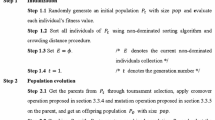Abstract
This paper is devoted to ponder a joint production and maintenance problem. For solving the problem, a genetic algorithm named similarity-based subpopulation genetic algorithm (SBSPGA) is introduced. SBSPGA is presented based on a well-known evolutionary algorithm, the subpopulation genetic algorithm II (SPGA-II). Compared with the SPGA-II, the innovation of the SBSPGA could be divided into two parts: (1) using a similarity model for the elitism strategy and (2) performing the algorithm in just one stage. To tackle the maintenance aspect, reliability models are employed in this paper. The aim of this paper was to optimize two objectives: minimization of the makespan for the production part and minimization of the system unavailability for the maintenance part. To execute our proposed problem, two decisions must be made at the same time: achieving the best assignment of n jobs on m machines to minimize the makespan and determining the time at which the preventive maintenance activities must be performed to minimize the system unavailability. The maintenance activity numbers and the maintenance intervals are not fixed in advanced. Promising the acquired results, a benchmark with tremendous number of test instances (more than 5,000) is employed.
Similar content being viewed by others
References
Adzapka KP, Adjallah KH, Yalaoui F (2004) On-line maintenance job scheduling and assignment to resources in distributed systems by heuristic-based optimization. J Intell Manuf 15:131–140
Aghezzaf EH, Jamali MA, Ait-Kadi D (2007) An integrated production and preventive maintenance planning model. Eur J Oper Res 181(2):679–685
Barichard V (2005) Hybrid approaches for multiobjective problems. PhD thesis, Doctoral School of Angers, France (in French)
Basseur M (2005) Design of cooperative algorithms for multi-objective optimization: application to flow-shop scheduling problems. PhD thesis, University of Sciences and Technologies of Lille, France (in French)
Berrichi A, Amodeo L, Yalaoui F, Châtelet E, Mezghiche M (2008) Bi-objective optimization algorithms for joint production and maintenance scheduling: application to the parallel machine problem. J Intell Manuf 20:389–400. doi:10.1007/s10845-008-0113-5
Cassady CR, Kutanoglu E (2003) Minimizing job tardiness using integrated preventive maintenance planning and production scheduling. IEEE Trans 35(6):503–513
Cassady CR, Kutanoglu E (2005) Integrating preventive maintenance planning and production scheduling for a single machine. IEEE Trans Reliab 54(2):304–309
Chang PC, Chen SH (2009) The development of a sub-population genetic algorithm II (SPGA II) for multi-objective combinatorial problems. Applied Soft Computing 9:173–181
Chelbi A, Ait-Kadi D (2004) Analysis of a production/inventory system with randomly failing production unit submitted to regular preventive maintenance. Eur J Oper Res 156(3):712–718
Ebeling CE (1997) An introduction to reliability and maintainability engineering. McGraw-Hill, USA
Fleischer M (2003) The measure of Pareto optima, applications to the multi-objective metaheuristics. Lect Notes Comput Sci, Springer (EMO’03) 2632:519–533
Garey MR, Johnson DS (1979) Computers and intractability: a guide to the theory of NP-completeness. Freeman, San Francisco
Gharbi A, Kenne JP (2005) Maintenance scheduling and production control of multiple-machine manufacturing systems. Comput Ind Eng 48(4):693–707
Jain AS, Meeran S (1999) Deterministic job-shop scheduling: past, present and future. Eur J Oper Res 113(2):390–434
Kaabi J, Varnier C, Zerhouni N (2002) Heuristics for scheduling maintenance and production on a single machine. IEEE Conference on Systems, Man and Cybernetics, October 6–9, Hammamet, Tunisia
Kaabi J, Varnier C, Zerhouni N (2003) Genetic algorithm for scheduling production and maintenance in a flow-shop. Laboratory of Automatic of Besançon, France (in French)
Kenne JP, Gharbi A, Beit M (2007) Age-dependent production planning and maintenance strategies in unreliable manufacturing systems with lost sale. Eur J Oper Res 178(2):408–420
Lee C-Y (1996) Machine scheduling with an availability constraint. J Glob Optim 9:395–416
Lee CY, Chen ZL (2000) Scheduling jobs and maintenance activities on parallel machines. Nav Res Logist 47(2):145–165
McCall JJ (1965) Maintenance policies for stochastically failing equipment: a survey. Manage Sci 11:493–524
Mellouli R, Sadfi C, Kacem I, Chu C (2006) Scheduling on parallel machines with availability constraints. Sixth International Francophone Conference of Modeling and Simulation, Mosim ‘06, Marocco (in French)
Pham H, Wang HZ (1996) Imperfect maintenance. Eur J Oper Res 94(3):425–438
Pinedo M (1995) Scheduling theory, algorithms and systems, 1st edn. Prentice Hall, Englewood Cliffs
Pinedo M (2002) Scheduling theory, algorithms, and systems, Chapter 2. Prentice-Hall, Englewood Cliffs
Qi X, Chen T, Tu F (1999) Scheduling the maintenance on single machine. J Oper Res Soc 50(10):1071–1078
Ruiz R, García-Diaz JC, Maroto C (2007) Considering scheduling and preventive maintenance in the flow-shop sequencing problem. Comput Oper Res 34(11):3314–3330
Schmidt G (2000) Scheduling with limited machine availability. Eur J Oper Res 121:1–15
Sherif YS, Smith ML (1981) Optimal maintenance models for systems subject to failure—a review. Nav Res Logist 28(1):47–74
Villemeur A (1991) Reliability, availability, maintainability and safety assessment. Wiley, USA
Wang HZ (2002) A survey of maintenance policies of deteriorating systems. Eur J Oper Res 139(3):469–489
Weinstein L, Chung CH (1999) Integrated maintenance and production decisions in hierarchical production planning environment. Comput Oper Res 26:1059–1074
Xu D, Sun K, Li H (2008) Parallel machine scheduling with almost periodic non-preemptive maintenance and jobs to minimize makespan. Comput Oper Res 35:1344–1349
Zitzler E (1999) Evolutionary algorithms for multi-objective optimization: methods and applications. PhD thesis, Swiss Federal Institute of Technology, Zurich
Zydallis JB (2003) Explicit building-block multi-objective genetic algorithms: theory, analysis, and development. PhD dissertation, Air Force Institute of Technology, Ohio
Author information
Authors and Affiliations
Corresponding author
Rights and permissions
About this article
Cite this article
Moradi, E., Zandieh, M. Minimizing the makespan and the system unavailability in parallel machine scheduling problem: a similarity-based genetic algorithm. Int J Adv Manuf Technol 51, 829–840 (2010). https://doi.org/10.1007/s00170-010-2666-7
Received:
Accepted:
Published:
Issue Date:
DOI: https://doi.org/10.1007/s00170-010-2666-7




